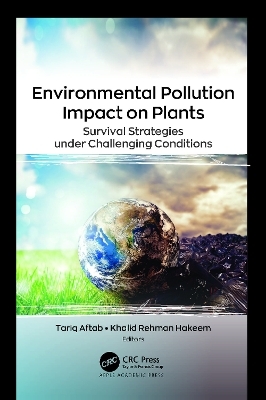
Environmental Pollution Impact on Plants
Apple Academic Press Inc. (Verlag)
978-1-77491-124-2 (ISBN)
This new volume studies the impact and management of environmental pollution on plants, often resulting in plant abiotic stress physiology, which causes reduction in growth due to alterations in biochemical and physiological processes, thus threatening food security, the ecosystem, and the plants themselves. This volume details the harm to plants caused primarily by heavy metal contamination in soils, by pesticides use, and by air pollution and presents several mitigation strategies as well.
Soils contaminated with heavy metals is a major challenge worldwide due to increase in anthropogenic and geologic activities. Despite the effectiveness of pesticides in preventing pest invasions and yield decline, pesticides and other air pollutants cause biochemical changes that can instigate leaf damage, stomatal impairment, early senescence, decrease in photosynthetic efficiency, interruption of membrane perviousness, and decrease of growth and yield in sensitive plant types.
Chapters in this volume address these issues. Topics include the antioxidant, photosynthesis, and growth characteristics of plants grown in polluted soils; the benefits and hazards of pesticides; microbe-assisted bioremediation and biotechnological advances for plant pollution control; genetically modified plants and their potential resistance to environmental pollution; and more.
Tariq Aftab, PhD, is Assistant Professor in the Department of Botany at Aligarh Muslim University, India, where he earned his PhD. He is the recipient of several prestigious fellowships. He was a Research Fellow at the National Bureau of Plant Genetic Resources, New Delhi, and Postdoctoral Fellow at Jamia Hamdard, New Delhi, India. Dr. Aftab was also a Visiting Scientist at the Leibniz Institute of Plant Genetics and Crop Plant Research (IPK), Gatersleben, Germany, and at the Department of Plant Biology, Michigan State University, USA. He has edited 14 books, coauthored several book chapters, and published over 65 research papers. Khalid Rehman Hakeem, PhD, is Professor at King Abdulaziz University, Jeddah, Saudi Arabia. He is formerly a lecturer at the university of Kashmir, Srinagar, India, and at Universiti Putra Malaysia, Selangor, Malaysia. Dr. Hakeem has more than 10 years of teaching and research experience in plant eco-physiology, biotechnology and molecular biology, medicinal plant research, plant-microbe-soil interactions, as well as in environmental studies. He was a visiting scientist at Jinan University, Guangzhou, China. To date, Dr. Hakeem has authored and edited more than 70 books, over 180 research publications, and 65 book chapters in edited volumes. At present, Dr. Hakeem serves as an editorial board member and reviewer for several high-impact international scientific journals.
1. Effect of Heavy Metal Polluted Soil on Physiology and Biochemistry of Plants 2. Pesticides and Their Impacts: Benefits and Hazards 3. Antioxidant, Photosynthesis, and Growth Characteristics of Plants Grown in Polluted Soils 4. Impact of Pesticides Use in Agriculture 5. Effect of Environmental Pollution on the Generation of Reactive Oxygen and Nitrogen Species in Plant Tissues 6. Plants and Microbe-Assisted Bioremediation of Heavy Metals Polluted Environments 7. Bioinformatical and Biotechnological Advances for Bioremediation and Plant Pollution Control 8. Ceratophyllum demersum (L.): An Aquatic Macrophyte for Phytoremediation 9. Genetically Modified Plants (GMPs) and Their Potential in Protection, Constraints, Prospects, Challenges, and Opportunities against Environmental Pollution 10. Detoxification of Sewage Sludge by Natural Attenuation and Application as a Fertilizers
| Erscheinungsdatum | 29.04.2023 |
|---|---|
| Zusatzinfo | 29 Tables, black and white; 9 Line drawings, color; 6 Line drawings, black and white; 3 Halftones, color; 2 Halftones, black and white; 12 Illustrations, color; 8 Illustrations, black and white |
| Verlagsort | Oakville |
| Sprache | englisch |
| Maße | 156 x 234 mm |
| Gewicht | 700 g |
| Themenwelt | Schulbuch / Wörterbuch |
| Naturwissenschaften ► Biologie ► Botanik | |
| Technik | |
| Weitere Fachgebiete ► Land- / Forstwirtschaft / Fischerei | |
| ISBN-10 | 1-77491-124-8 / 1774911248 |
| ISBN-13 | 978-1-77491-124-2 / 9781774911242 |
| Zustand | Neuware |
| Informationen gemäß Produktsicherheitsverordnung (GPSR) | |
| Haben Sie eine Frage zum Produkt? |
aus dem Bereich


